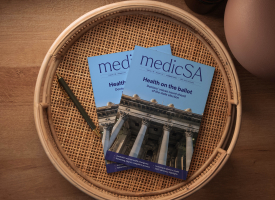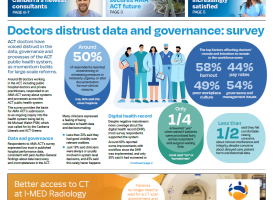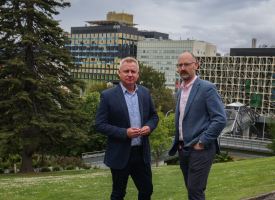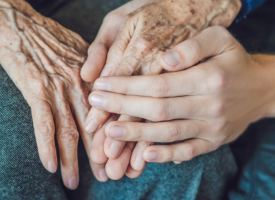Dr Sarah Whitelaw launches Public Hospital Report Card - Mental Health Edition
Transcript: AMA Emergency Medicine Representative, Dr Sarah Whitelaw press conference, 7 November. Subject: Launch of the AMA Public Hospital Report Card – Mental health Edition

DR SARAH WHITELAW: Today we're launching the AMA Public Hospital Mental Health Report Card. It's really clear from this report that our hospital logjam, the immense strain that our public hospitals are currently under, is impacting this group of patients who have severe mental health illness more unfortunately than any other group of patients.
What we're seeing in the emergency department is an increasing number of patients presenting to emergency departments. We're also seeing that they're more severely unwell, more of them are coming by ambulance and more of them are needing admission to specialised mental health beds that simply aren't there. What this report makes confrontingly clear is the significant decrease in the number of mental health beds in Australia that we've had over the last 30 years - a decrease of almost 40 per cent, a decrease in the actual number of beds. And when you look at the number of beds by head of population, considering that the population increased by over 7.5 million in that time, that’s a really significant decrease in the number of mental health beds available for Australians.
Unfortunately, the need for those beds just continues to go up, and the rates of presentation per head of population into emergency departments has actually doubled since 2004. So we now have patients arriving into the emergency departments who need specialised mental health admission, for whom the beds are already full, who are staying not just hours, but days. We are expecting these patients - and let's face it, up to one in five of us have mental health issues currently - these patients are our family and our friends and our loved ones, and we're expecting them to stay, often in a very small ED cubicles in an environment where the lights are very bright and 24/7, it's loud, it's noisy and they are surrounded by very unwell patients and their families. We're asking them to be quiet and stay still and delay the continuation of the specialised mental health care treatment that they need.
This is a situation that was very severe before COVID. It's a little bit unclear what impact COVID will have on our rates of mental illness in Australia, but what we do know, if we look at the last 30 years, is that the rates of mental illness and the rates of severe mental illness continue to go up. We need to plan for that. We've had an enormous amount of advocacy. We've had significant investment in this area. We've had an enormous number of recommendations from Productivity Commissions and Royal Commissions. It's time for those plans and those recommendations to be implemented. Yes, we absolutely need investment in community mental health and in preventative mental health. We need GP-led collaborative care. That is really clear. But we also need investment in our public hospital system right now. We need to increase the capacity and the number of our mental health beds available for people who are acutely unwell. That means retaining the staff that we've already got and rapidly recruiting more staff so that those beds that we do have can stay fully open.
We need the Federal Government to commit right now to an increase in public hospital funding to 50 per cent share with the states, so a 50-50 share. We need to remove that 6.5 per cent cap that prevents some of the state governments putting in the additional funding that they know is needed. We need to make sure that the state governments commit to using that extra 5 per cent funding from the Federal Government to put directly into the public hospital system. And we need all of the recommendations, the plans, the promises that are being made around Australia to deal with acute mental health illness both in the community but also in the public hospital setting, to be implemented right now. We simply can't wait any longer.
I think the key with this issue is that it's not a state issue, it's not a regional issue. Every single state and territory of Australia, in all regions, from metro to regional and remote and rural areas, we are seeing really significant problems and a group of patients who are very vulnerable in terms of our mental health problems be more disadvantaged than any other group. It's got to stop.
QUESTION: You mentioned a bit about the rhetoric and the investment that's been going on since COVID unveiled or showed us what a big issue the mental health of people are. Are we seeing public hospitals having to pick up the slack in the delay of all of these services coming through?
SARAH WHITELAW: I think that's a really good question, and I think that public hospitals- by the time a patient gets to a public hospital emergency department in need of emergency treatment for their mental health illness, often a lot of the other community and preventative healthcare opportunities have fallen through. So yes, to an extent the public hospital is picking up the slack, if you like, or dealing with the problems in our community and mental health system.
But there will always be a proportion of people who are really unwell from their mental illness. We need emergency care, we absolutely accept that, and we'll need specialised mental health admission to a unit and a bed with staff that are absolutely expert in treating that person's mental illness in an environment that's safe and appropriate for them. So whilst we need to invest much more in propping up that community system, meeting the gaps between those federal and state responsibilities and funding responsibilities, where a lot of people fall into at the moment, we also need to make sure that the capacity for our public hospitals to deal with really unwell mental health patients is still there also. We're failing on both accounts at the moment.
QUESTION: How bad is it at the moment? I mean, is it an actual crisis? Is it an emergency that's happening right now?
SARAH WHITELAW: It is- mental health care for people in emergency departments has been at crisis level unfortunately for at least the last five years, so this is not a new problem for us. What we are seeing is it's worse now than it's ever been. It's been steadily getting worse for decades, and the impact of COVID has made things much harder. In terms of strain on the whole public hospital system, it has increased the number of emergency department presentations throughout COVID.
The impact will be felt for many years to come. It's really important that we don't see COVID as a temporary crisis that needs temporary resources and that people will somehow get back to a more normal situation that won't need the resources that we're asking for. That's simply not the case. Absolutely, it is a crisis at the moment.
Imagining what it's like for a patient who's incredibly unwell from their mental illness, now that those wait times in the emergency department for admission are stretching out from hours to days and days, it's impossible to call it anything other than a crisis.
QUESTION: Why have we lost those beds? I mean, obviously the problem's only increased. Why are we seeing a reduction of beds?
SARAH WHITELAW: Again, a terrific question. In the early '90s Australia, like many countries around the world, decided it was more appropriate, and if we could invest more in community healthcare for mental illness and preventative care, that we should be able to reduce the need for admissions to specialised psychiatric institutions. So at that point our strategy was to reduce the number of beds available or get rid of the number of mental health care beds available in standalone psychiatric institutions, but also in other mental health units. And unfortunately, we haven't invested what we needed to in community and preventative care to actually decrease the number of people needing admissions to the point where we had enough beds for them.
We've also seen an increasing number of people having mental illness and an increasing number of people having really significant mental illness that does in fact need acute mental health care and acute mental health admission. We knew this around 2015 to 2016 when the other OECD countries started to realise that some of them had reduced the number of mental health care beds that they had available quite too far. And no matter how good your community and mental health preventative systems are, there will always be people that need emergency care and need emergency admission. We have realised that, but unfortunately at the moment it's just too little, too late. There are a number of initiatives and recommendations that recognise the need to increase beds and to increase staff. They need to be prioritised. We can't wait another five or 10 years for those plans to be implemented. We really need to take a step back and look at how significantly disadvantaged our mental health care patients are and the fact that that's getting worse for them and really re-prioritize our resources and do something about this right now.
QUESTION: COVID showed us how quickly there can be a health response in terms of setting up COVID wards, that sort of thing. Do we need to take a similar attack with what's going on in the mental health area?
SARAH WHITELAW: Absolutely. We need to involve clinicians right across the mental health care workforce. That's allied health, that's specialised mental health care nurses, that's our specialist general practitioners. Our psychiatrists, our psychologists, our other medical staff, and our other clinical staff right across the spectrum, together with patients and their families, need to apply that COVID crisis mentality, if you like, realise that this is a crisis. We need to act fast. We need to take advantage of some of the great lessons that COVID taught us about how quickly we could act when we all realise that this was a crisis, that we needed to listen to each other and get some solutions in place as quickly as possible. That's a lesson from COVID that we don't want to lose.
QUESTION: How critical is changing the funding model to this happening?
SARAH WHITELAW: Absolutely critical, both for the public hospital system in general and its place within our health system, but particularly for these mental health patients who are really suffering. That increase in a 50 per cent commitment from the Federal Government will allow hospitals to recruit more staff, and that is something that they need funding security for. No amount of temporary or patchwork siloed grant funding can actually allow our health system to recruit the staff that they need long term into the future, and that is why it's crucial that the Federal Government makes a commitment to long-term increasing its public hospital funding to 50 per cent.
QUESTION: Anything else you'd like to add?
SARAH WHITELAW: No. I think we're done. I think that just that key issue that, really, this is a crisis all around Australia that I think is sometimes difficult for people to grasp - the breadth of the problem, that it's not just their experience in their public hospital; that in fact, if you replicate that hundreds and thousands of times a week for mental health patients across Australia, you'll begin to realise the breadth of the problem.
QUESTION: It's got to be hard as well for the people working in the ED where they're doing triage. Obviously, when it comes to breathing, people who have got broken bones, that sort of things, mental health issues must fall way down the category.
SARAH WHITELAW: Look, they don't. And many people are really unwell with their mental health issues and they also need emergency care. So they get triaged into that same system of urgency. What is absolutely causing despair amongst staff and their patients is the sense that you know what care these patients need, you know how quickly they need to continue their specialised mental health treatment, you know how important it is for them to be in an environment that's safe and appropriate for them, but you can't make that happen. And to watch people these people have to stay in an environment that is absolutely more stressful for them for hours, sometimes days, is really difficult for staff to watch when you aren't able to do to the job that you feel you should be able to do for these patients.
It is important to recognise that there is a contribution to increased occupational violence associated with people being forced to wait in emergency departments for so many hours waiting for admission. And that's happening around us every day. That is something that staff and patients also deal with, that increased aggression and behavioural issues and behavioural disturbances, that sometimes result in physical harm but almost always result in mental stress and strain and contribute to burnout for mental health staff but also for staff in the emergency department. That's a really significant problem when every single one of our healthcare workforce counts.
QUESTION: Do the staff exist? If we were to bring back these beds, I mean, are there staff to recruit?
SARAH WHITELAW: I think- when we think about a bed, we often think about a physical bed. And when we talk about beds, we mean a bed that's really staffed with nurses, allied health clinicians and doctors, and other hospital staff that actually are involved in caring for the patients in that bed. So at the moment we do have a workforce shortage, but we've also got a funding shortage. So, to an extent, there isn't any point recruiting more workforce unless we're looking at why the workforce are currently leaving and making sure that we're doing everything we can to keep the workforce that we've got and that we're appropriately funded to be able to employ new workforce that we recruit. So when we train new people, we also have to dedicate the funding to be able to employ them to provide that care.
QUESTION: Thank you.
SARAH WHITELAW: No worries.



